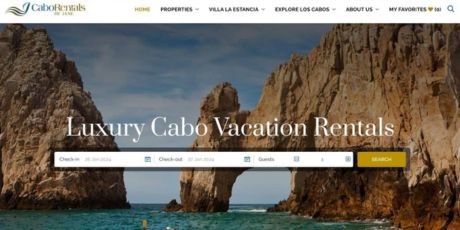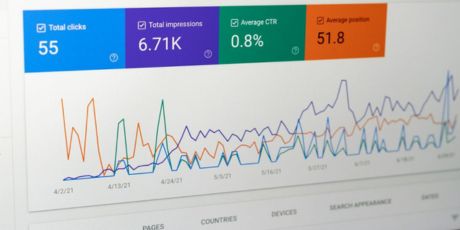CHAPTER 7
Local SEO for Vacation Rentals
CHAPTER SECTIONS
Local SEO is essential for property managers who want to generate bookings for their properties from local visitors. Perhaps you are already familiar with the basics of vacation rental SEO, so maybe you think you have local SEO covered. Not quite.
Local ranking factors are different from the traditional search engine ranking factors. Ranking locally depends heavily on your ability to produce content that is relevant to a local audience and keeping your Google My Business (GMB) profile fully up to date.
In this chapter, we’ll discuss local SEO for vacation rental owners and property management companies. It covers the following:
- What is local SEO?
- Why local SEO is important
- Understanding local and organic search results
- How does local SEO work?
- What is Google My Business?
- How to improve visibility in local search for vacation rental websites
Let’s dive in.
Really, local SEO for property managers is a simple concept. But actually implementing the best practices can be a challenge. Let’s start with what local SEO is, exactly.
What Is Local SEO?
Local SEO is the practice of optimizing your website, similar to that of traditional SEO, around a specific local area.
Why Is Local SEO Important to Vacation Rental Managers?
Even before local SEO became a buzzword in the vacation rental industry, ranking locally was critically important to vacation rental managers.
When you dominate the search engine results pages (SERPs) for terms relevant to your business, that means you get more business through direct bookings and phone calls from your website.
But today, the importance of local SEO for vacation rental companies skyrocketed. And it’s likely going to stay that way. Let’s take a look at a couple reasons why:
Drive-To Markets Saw a Spike During COVID-19
Air travel and mass transit restrictions for COVID-19 put long-distance travel in a chokehold. As the industry gasped for air, drive-to markets started to feel the breeze pick up. More people were interested in taking vacations in places they could easily drive to. And for many vacation rental managers, that’s a sweet spot to be in.
So, when people in Chicago wanted to get out of town somewhere within a couple hours’ drive, who benefited? It wasn’t the major hotels in Milwaukee, Wisconsin — it wasn’t even hotels at all. Social distancing is a challenge in that kind of space. Vacation home rental businesses in drive-to markets came out on top in both new business and Google searches.

Sadly for some vacation rental managers, the OTAs took a big portion of the industry winnings. But those who were already focused on local visibility for their vacation rental businesses were well-positioned to reap the rewards of the increase in drive-to market traffic.
Even as faith in air travel shakily returns, you can bet that more people will consider private vacation rentals and driving to their destinations well into the future.
Staycations Have Become the New Vacations
What’s easier than driving a few hours to a vacation rental? Driving across town to a vacation rental.
As Forbes put it in a recent article, “staycations are the new vacations.” Interest in staycations spiked as travel restrictions came into effect, but this trend existed long before COVID-19 changed the world.
In a chaotic world of emails, video calls, the 24-hour work cycle and more, people want something easy when they take a vacation.

Staying in your local area is the easiest way to take a vacation. Many choose to vacation in their local area rather than travel and pay the ridiculous airfares.
And this trend means property managers have yet another reason to hone their local SEO skills.
Understanding Organic and Local Search Engine Results
Organic search engine listings are those that Google has indexed and ranked based on a number of factors — called ranking signals — and shown to users who enter relevant search queries.
One relatively new ranking signal is whether a listing is “local,” meaning the business it is associated with or the content it is discussing are relevant to the geographical location of the searcher.
As is often the case in the travel industry, searchers are entering search terms about locations other than their own. In cases like this, Google will attempt to display results that are local to the searcher’s intended location.
Put simply, local SEO is an effort to rank your short-term rental site for queries that are “local” to the area the searcher is wanting information about. Your success with local SEO will rest largely on your ability to produce high-quality content optimized for local keywords.
Quick Note About Local Keyword Selection
As a property manager in the travel industry, it’s very likely that about 95-99% of the target keywords and keyword ideas you want to rank for will have some form of local search intent.
A lot of SEO tips just gloss over this when explaining how to find keyword ideas for your web page. Most keywords you find will have a variation of your destination in them (or they should) since you don’t want to be targeting any ultra competitive phrases like “cabins”.
Don’t overlook this when doing your keyword research. There may even be local terms you hadn’t thought of that may be good drivers of local bookings even if they have low volume.
Local Search Results Features
With local, there’s two main sections of the search results pages that will surface. For property management companies and vacation rental agencies, there’s a third SERP feature to pay attention to as well.
Local 3-Pack
Sometimes called the “Local Pack” results, these are Google’s prominent map listings that show three local businesses relevant to the search query. This also features a businesses phone numbers, reviews and ratings, and more.
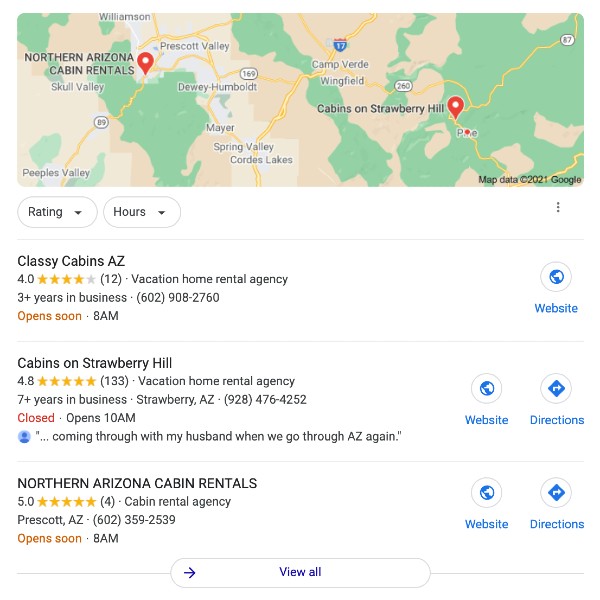
A Strong About Us Page
These are the more traditional search results below the map pack but they are heavily favoring local businesses in the rankings.
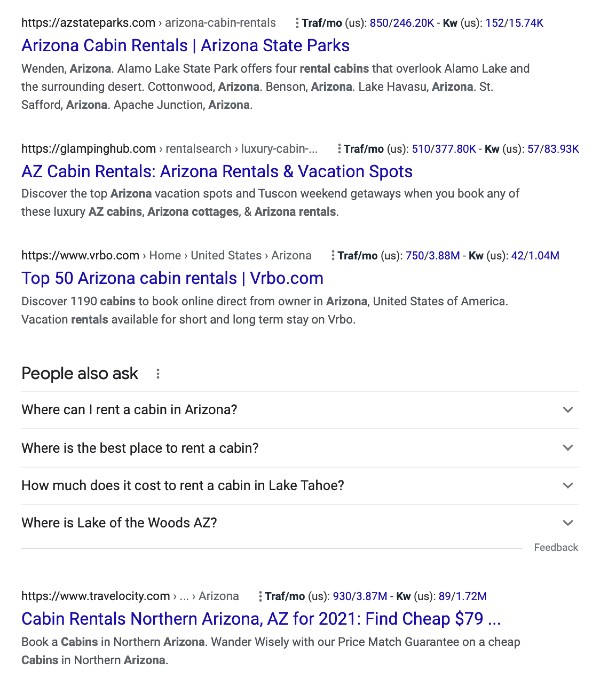
Google Vacation Rentals Feature
Similar to Google Hotel and Google Flights, this is another prominent feature that Google was testing and has now become a permanent feature of Google’s search results (as of now, at least). This feature surfaces vacation rental agencies as well as OTAs that are listing properties for rent.
Technically, this isn’t a local SERP feature but it will appear for local queries so we’re including it.
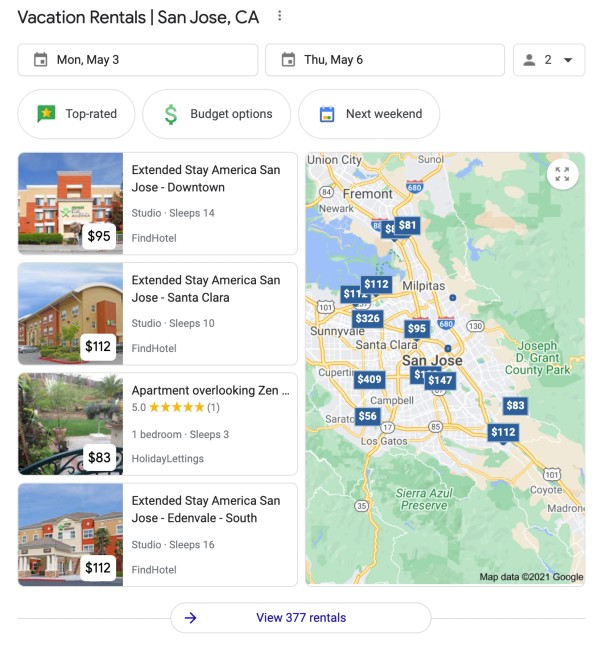
In the next section we’ll cover the types of queries that tend to generate these results and features.
What Queries Generate These Local Search Results Features?
Using a VPN connection we can try to show some examples of the differences in these search results.
For this example, we’re given an IP address in Pennsylvania so Google thinks we’re actually searching from there instead of Phoenix and will show us local results from that area.
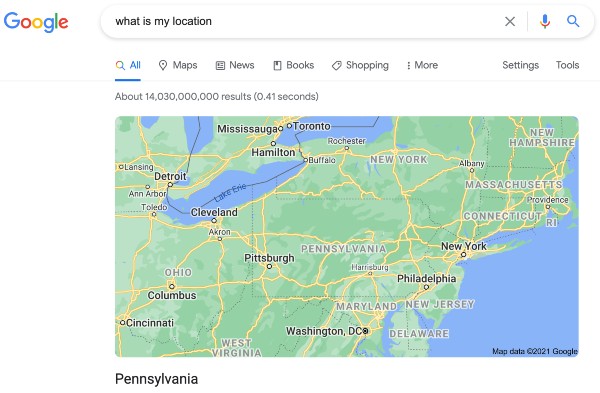
Search Queries with Local Modifiers
When you think of local SEO you probably think about queries like “restaurants in <location>” or “<location> beach condos”. Both of these searches contain local modifiers and as expected will return local results that satisfy those queries.
If we search for “harveys lake restaurants” which is located in Pennsylvania, you’ll get a set of results like these:
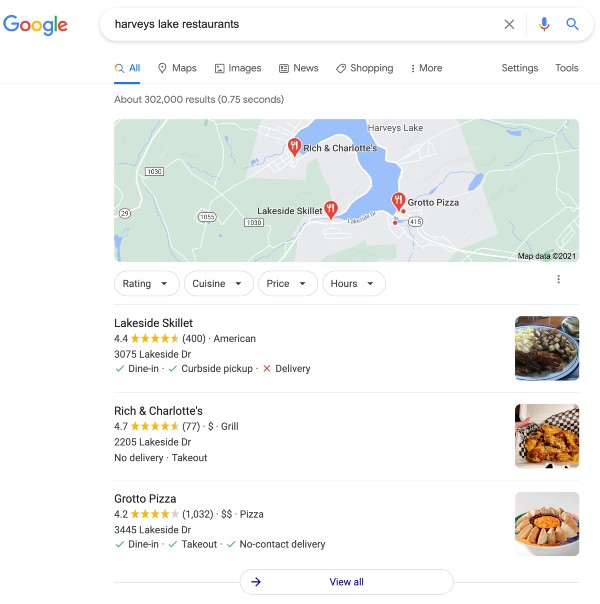
Local Search Queries without Modifiers
Another form of local search are those that do not contain local modifiers. An example would be searching for “plumbers” or “handyman near me”.
These local searches don’t contain the obvious local modifier but return local results based on the business’ proximity to the searcher. There’s several other factors at play here but the most common is your location when performing the search.
The search results for “restaurants near me” in Pennsylvania will be similar to those above.
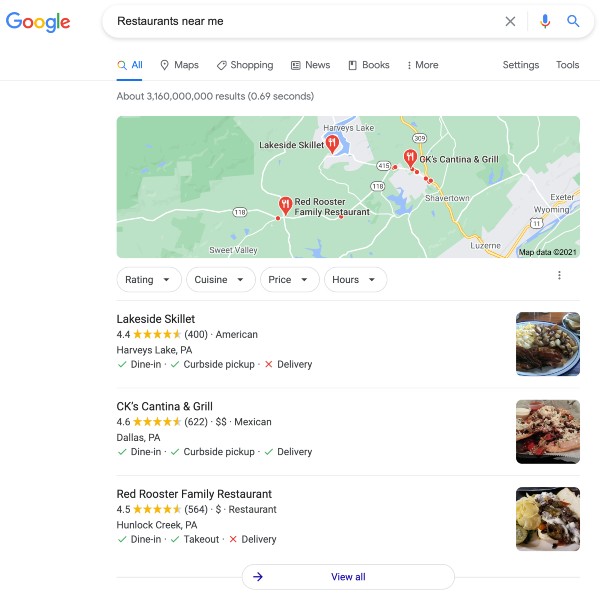
Localized Organic Search Queries
A slight variation on these types of searches are queries that are performed outside of the geographic region of your rentals.
For example, most travelers are going to research your destination before committing to booking so they may try searches to learn more about the area.
Let’s say your guest lives in Minnesota and they want to visit a warmer climate during the winter months with their other snowbird friends. They may search for things like:
- Things to do in Phoenix during winter
- Phoenix restaurants with patio seating
- Best Phoenix golf courses
Even though the origin of these searches are in Minnesota, they’ll be served localized results that contain Google map results as well as local organic results.
Using our PA example, here’s the localized organic results for “Harveys Lake cabin rentals” when searching from Phoenix:
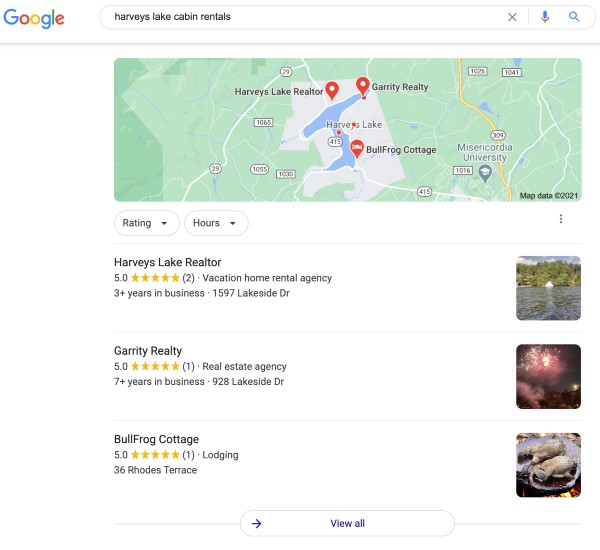
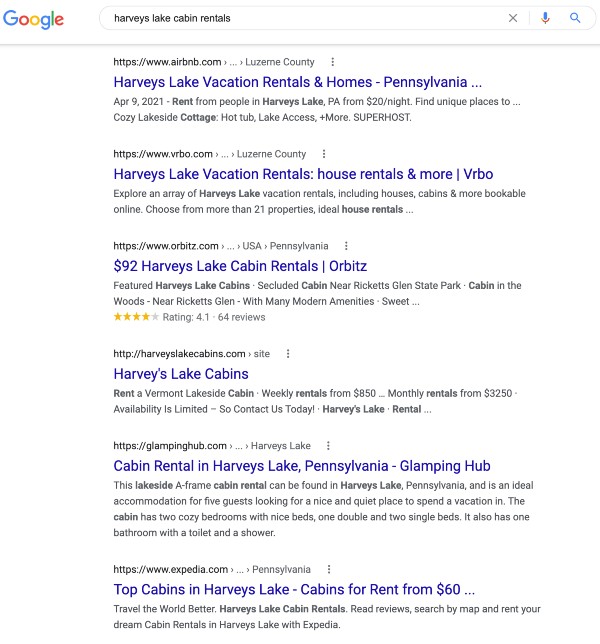
How Does This Apply to Your Property Management Company?
Using our example of “Harveys Lake”, we can see that searches for the big terms like “harveys lake vacation rentals” or “harveys lake home rentals” returns the Google Vacation Rental search feature.
This is similar to the Hotel pack that has been prevalent in the hotel and bed & breakfast industry.
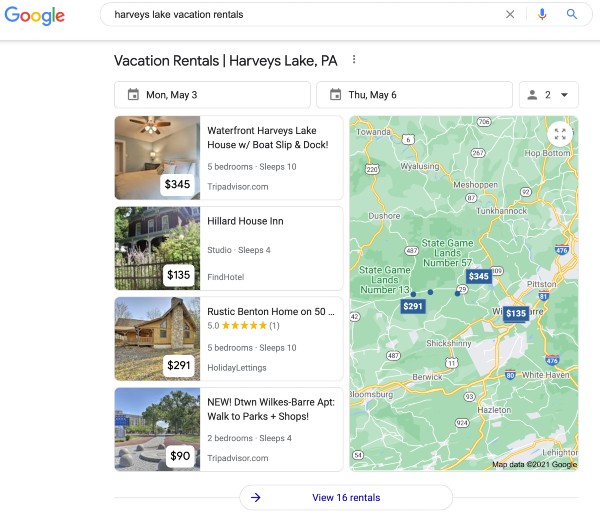
However, for a search query with less volume like “Harveys Lake cottage rentals” or “Harveys Lake cabin rentals” the results that are returned resemble the traditional local results with map results, no Google Vacation Rentals feature, and primarily includes vacation rental managers.
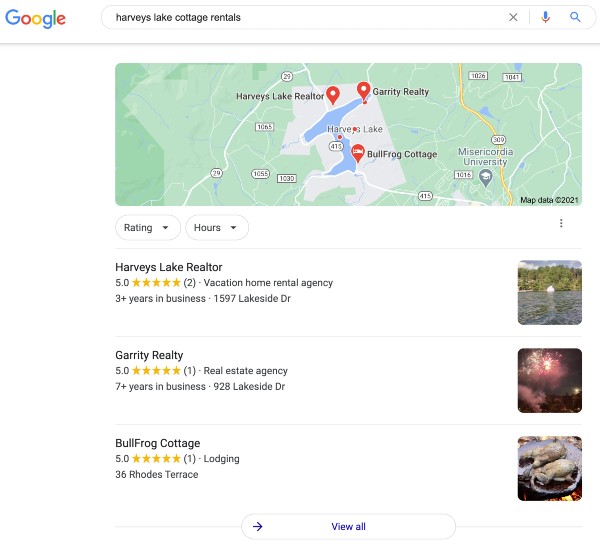
The main takeaway here is that the major rental aggregators, metasearch companies and OTAs can’t rank in the traditional local 3 pack results because they don’t have a local presence there.
This makes it a much smaller pool of competition and can still drive bookings if your property management company shows up here (which is prime real estate btw).
This is one of the reasons why it’s super important for a property manager to be sure they’ve claimed and optimized their Google My Business listing as this will allow you to compete on a level playing field.
How Does Local SEO Work?
When you look at your competitors who are already ranking for your local area, you probably wonder why their sites are at the top and your site is not. Either by luck or through understanding, top-ranking local vacation rental site owners have most likely implemented local SEO best practices.
The Local Ranking Algorithm is Different
If you’ve completed our other sections on vacation rental SEO, you’ve probably read a little about the Google ranking factors.
The local ranking factors are actually part of a completely different algorithm and while there is some crossover between the two, the local factors require a different set of tactics.
Here’s a look at the local search ecosystem and how complicated it can get. This graphic shows how companies like local aggregators and search engines exchange and access their data. All in an effort to help surface accurate local results.
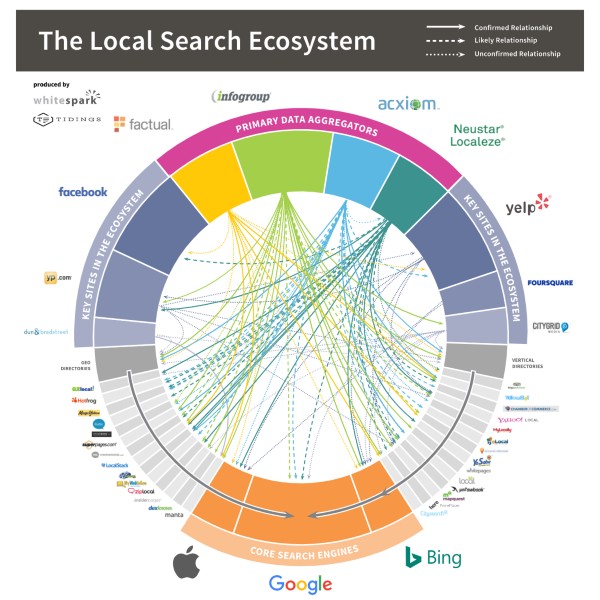
In fact, according to a 2020 study by Whitespark (a local SEO marketing company), they’ve determined there’s at least 50 ranking factors for each type of local result:
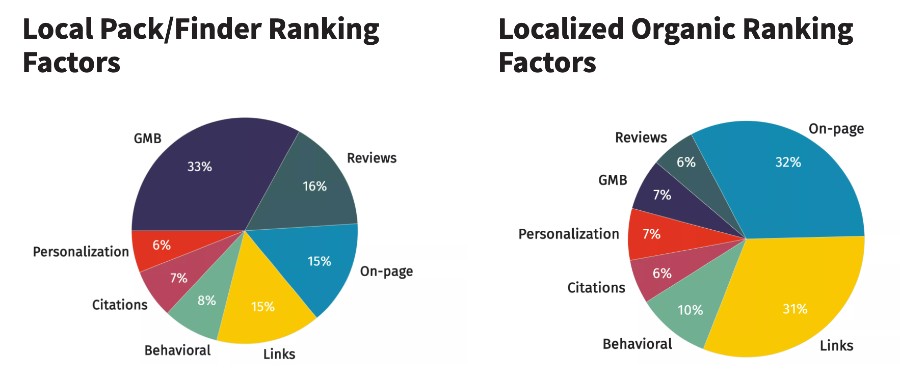
Here Are the Top 3 Local Ranking Factors for Each Type of Result
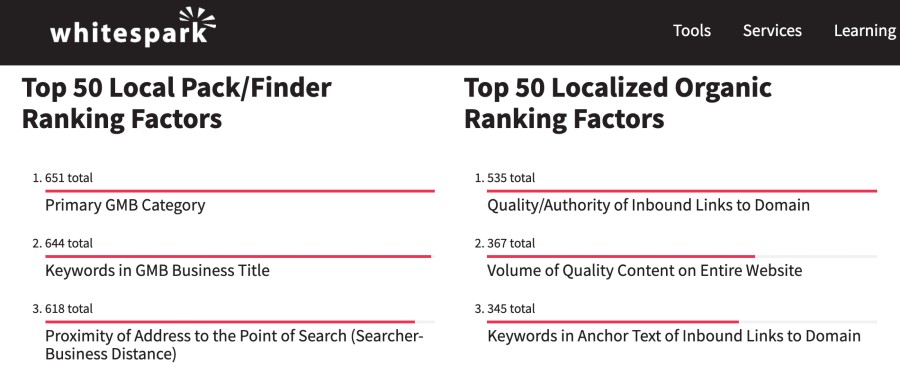
Local Pack Ranking Factors:
#1: Primary GMB Category
Make sure your GMB category closely matches what you want to rank for. In the case of property management or vacation rental agencies, you’ll want to choose something like “Vacation Home Rental Agency” or “Cabin Rental Agency”.
#2: Keywords in GMB Business Title
This one is a little controversial because a lot of spam shows up in these results as companies just stuff keywords into their title tags.
You want to include your business name as well as a core keyword but don’t overdo it. A simple title tag like “<business name> + vacation rentals” would be more than enough if your keyword isn’t already part of your business name.
#3: Proximity of Address to the Point of Search (Searcher-Business Distance)
Obviously, you can’t change or affect this one but it is important to understand.
You can’t keep moving your business all over town but you have about a 10 mile radius of coverage from your main place of business to have this factor be relevant to your business.
If you have multiple business addresses, you should set up GMB profiles for each one.
Localized Organic Ranking Factors:
#1: Quality & Authority of Inbound Links to Domain
This is one of those ranking factors that works well for both local and traditional SEO. Try to acquire high-quality links to your domain including links from local sources.
#2: Volume of Quality Content on Entire Website
Creating locally-focused, optimized content for your website creates a theme around your destination. Search engines will use this signal to return your site for local queries.
#3: Keywords in Anchor Text of Inbound Links to Domain
Getting links to your site with local keywords in the anchor text is important but don’t overdo this one either.
At the end of the day, your link profile should look natural and have a mix of keywords, your brand, generic terms like “click here”, URLs from your site or your domain name.
Other Factors to Pay Close Attention to Include
On-Site Signals
NAP: Name, Address, Phone Number
This means you should have your business name consistently used throughout your website along with your address and phone number in the same, consistent format.
Citation Signals
Citations are mentions of your business on other websites that contain your NAP.
NAP Consistency
Similar to on-site NAP, you want to be sure your business information is up to date, accurate and consistent on all sites. This is where local aggregator services come in handy. Luckily, there’s been some evidence of citations being of less importance recently so you may not need to worry about them as much.
We’ll cover Google My Business in more detail in our guide to setting up and optimizing your GMB profile but here’s a quick overview.
What Is Google My Business (GMB) aka Google Business Profile (GBP)?
Google My Business is a free service from Google which allows you to promote your local business online in search and in Google Maps.
Google My Business also contains a dashboard where you can respond to reviews, publish posts and photos, and answer questions asked on your Business Profile. Soon you’ll also be able to take messages directly from potential guests.
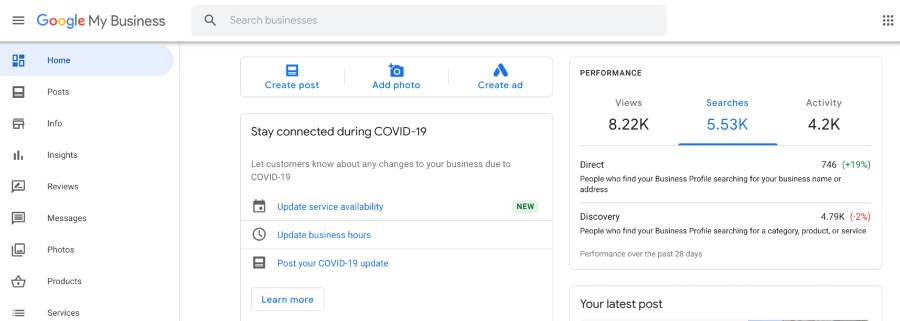
Your Google My Business (GMB) profile is perhaps your biggest local SEO tool. But simply claiming your profile and adding a little bit of text is not enough to outrank the competition.
GMB for Vacation Rentals: Overview
GMB is an essential tool for short-term rental property managers. Having a well-optimized GMB profile is known to improve how a property management website ranks in the local organic search results and Google Maps results.
This is extremely important when it comes to your local search visibility, as you’re operating in highly competitive markets in popular tourist destinations.
Below, you’ll discover three reasons why GMB is essential for companies in the vacation rental industry.
#1: Relevance
Having an up-to-date, well-maintained GMB profile shows prospective clients that your property management company is open for business and relevant to their search.
#2: Proximity
Many potential vacation home renters are looking for houses within specific distances of where they live or where they want to travel.
#3: Prominence
Vacation rental companies with strong GMB profiles tend to be more active in their regions than those that don’t maintain these profiles.
Not only will you be more visible to potential clients as they search — both in organic search results and Google Maps — but you will seem more legitimate and trustworthy thanks to the details on your GMB profile.
Google Business Profile Optimization: Overview
One of the most effective ways for property managers to enhance their local search engine rankings is to keep their GMB page updated and accurate.
By keeping your information current, you allow your target audience to accurately assess what properties you have to offer, how to book them, and where your property management company operates.
Here’s an example of a vacation rental business that has fully optimized their GMB.
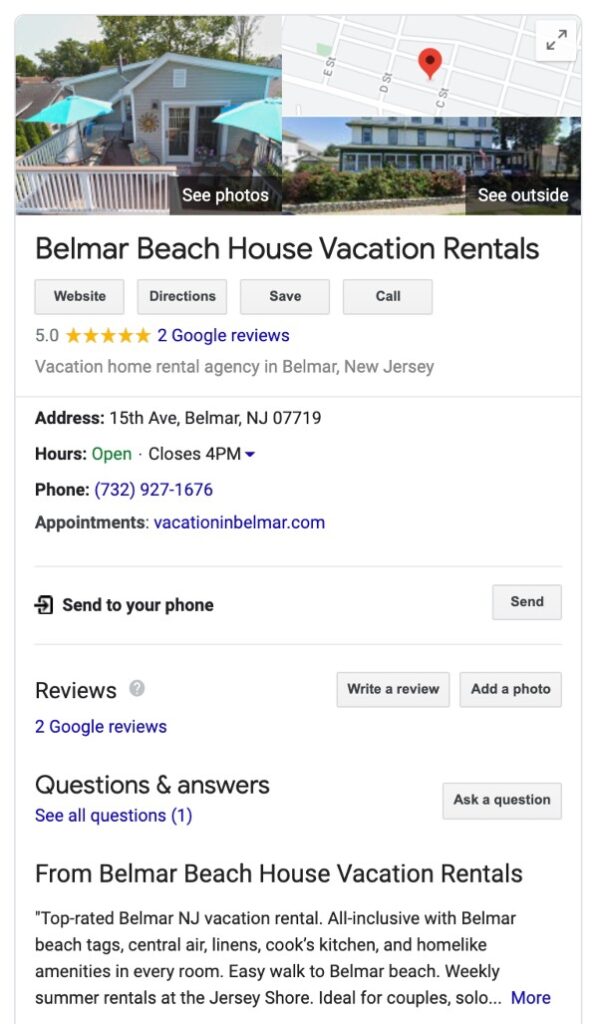
Here are a few Google Business Profile best practices to adhere to:
#1: Updated Business Name, Address, & Contact Information
Your website probably already ranks well for the name of your property management company, but your GMB profile will help you further establish authority for it. Be sure to include the address of your property management office, not your individual properties.
Google doesn’t approve profiles for individual properties; only the agency office (at least they’re not supposed to but we have seen some cases of this). This will tie directly into Google Maps rankings, too.
Furthermore, having contact information that enables a searcher to easily reach out to you with any questions lets potential guests know they’re dealing with real people.
#2: Correct Business Categories
As part of your GMB optimization, you have to choose primary categories for your business. You want to ensure that these are as focused and accurate as possible.
For example, for a vacation rental company, “Property Management Company” would be a poor choice because it’s not as focused. “Vacation Home Rental Agency,” however, would be more applicable.
For traditional property management companies, choosing “Property Management Company” would be just fine.
For your secondary categories, you should choose other variations of business types that are relevant to what you offer.
#3: Updated Photographs and Posts
Do you have new rentals that you just took pictures of or a new blog post that you created? Post it on your GMB page and highlight the great amenities your properties offer.
Highlighting your vacation rental properties gives your guests further points of reference when deciding whether or not they should book one of your rentals.
How to Improve Visibility in Local Search for Vacation Rental Websites
With local search strategies, you have several opportunities to increase the visibility of your rental business online. We discuss three of the most common ways to improve local visibility below:
Local Content Creation
As you begin to optimize your vacation rental site with a local SEO strategy, start with a laser focus on content for your primary destination. Start with the city where your business is located.
While you probably want to expand outward to neighboring towns, beaches and landmarks, you want to begin locally first because you will have the easiest time establishing local authority with Google if you focus on the place where your business actually exists.
The better you are at establishing your local presence, the more likely you are to be able to expand further than just ranking for hyper local terms.
Google Review Cultivation
Most VRM know the importance of getting reviews for their properties whether that’s on their own site or on listings on Vrbo or AirBnB. Both are important.
Equally as important for local search, is getting reviews from past guests on your Google My Business profile. This will help your rankings in the local packs, Google Maps, and to an extent your localized organic results.
Reviews can also be a powerful tool in your property management marketing efforts. They can influence bookings, conversion rates, and can be used in online or offline marketing efforts.
PRO TIP
Most vacation rental platforms will allow you to send post-stay emails requesting reviews for your properties.
Once you have a good number of reviews on your website, it would be wise to invite departing guests to leave reviews on your Google Business Profile to boost local rankings.
Updates and Engagement
Every online property, website, or profile linked to your business needs to be active. This not only casts a wide net for visibility by actual people, but it also sends signals to search engines that you are an active, engaged business in your community.
The updates and engagement you need to focus on include your website but extend far beyond it.
Think about your social media profiles, GMB and local business directories. Posting content is key, but when people respond to that content, you need to engage with them to answer their questions or provide more information.
Get Listed on Local Directories
Business directories play a huge part in your local SEO efforts. You need to claim or set up and optimize the most relevant directories in your industry and near your location.
Each of these profiles should have a link to your main website — a huge plus for your traditional SEO efforts — but you also need to take advantage of any ability to post content like blog posts on these directories.
Also, ensure that you have accurate contact information on every available directory listing.
Location-Based Landing Pages
As you build your local authority and rankings, you will need landing pages on your site dedicated to each location in which you have rental properties.
For example, if you have properties in three cities, you need a separate page optimized for each location. This allows you to target local long tail keywords as well which is an SEO best practice you should be employing anyway.
That way, when people search for properties in those cities, they have somewhere specific and relevant to “land” on your site.
To learn more about how to develop the content for these pages, refer to Chapter 3: Vacation Rental Content.
